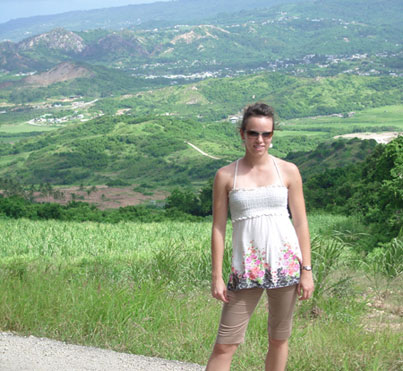Notes from the Field: Gender and water scarcity
Notes from the Field: Gender and water scarcity McGill University
User Tools (skip):
MCGILL'S WATERWORLD
Gender and water scarcity

Alicia Suchorski
My research is centered on water, specifically water in Barbados. Why study water on an island where a 360-degree view includes water as far as the eye can see? Surrounded by the Atlantic Ocean and the Caribbean Sea, Barbados is one of the nations where freshwater resources are scarcest – a situation similar to other Caribbean nations. This is where McGill's Caribbean Water Initiative (CARIWIN) project comes into play.
CARIWIN is designed and implemented by McGill's Brace Centre for Water Resources Management and the Caribbean Institute for Meteorology and Hydrology in Barbados. The project's purpose is to implement a holistic way to view and manage water resources, known as Integrated Water Resources Management within Grenada, Guyana and Jamaica. This approach takes into account various scientific and social considerations, and under the latter we find the issue of gender.
Gender and water are intertwined. When water is not piped directly into a home, it has historically been the responsibility of the woman of the household to fetch it. Although not an issue in developed nations, in developing countries, women have to walk many kilometres a day to obtain water for drinking, cooking, cleaning and so on. Because women need to spend their time collecting water, they cannot work or have an income, and that is one way the cycle of poverty sustains itself.
Although water is allocated through a piped system through virtually all of Barbados, crumbling infrastructure and an inconsistent terrain mean service is often interrupted. This leads to periods where water needs to be collected. My work consisted of surveying individuals in the parish of St. James and in St. Lucy in the north. Going to people's homes, we conducted a survey on how they use water in the home: who does the water-related tasks (including cooking cleaning, washing the car, watering the garden, etc.), how much water is used, and how much time is allocated for these tasks per gender.
Preliminary results show there isn't the same strong divide along gender lines as there is with these tasks in developing countries. This is because virtually everyone has piped water coming into their home. However, women more often than not still do the household tasks of cleaning, cooking, washing, etc. even if they work outside the home as well. I expect sharper divisions along gender lines when I go back to survey the other parishes, where breaks in water service force people (probably the women) to go to community standpipes to fetch water.
Although some of the people met us with raised eyebrows and skepticism, virtually everyone else was kind, welcoming, and more than willing to provide me with their two cents' on how water is managed and viewed in their country. One woman even gave me a bag of limes from her orchard.
I met one man who made me change my ways more drastically than ever. He was on welfare due to a work-related accident, and since his welfare cheque had not come in, he could not pay his water bill. The government agency responsible for potable water allocation (the Barbados Water Authority) turned off his water, forcing him to steal from his neighbours. That's something that will make you think twice about taking a long shower.
Alicia Suchorski is an M.Sc. candidate in the department of BioResource Engineering under the supervision of Dr. Chandra Madramootoo. Her thesis work is based on water and gender issues in Barbados, under a broader McGill project that looks at Integrated Water Resources Management in the Caribbean. This project is partially funded by the Canadian International Development Agency.

